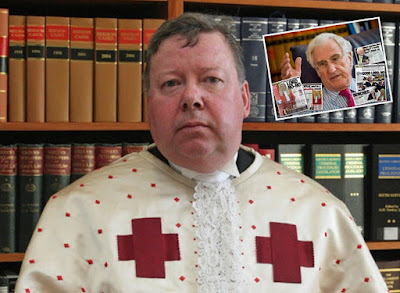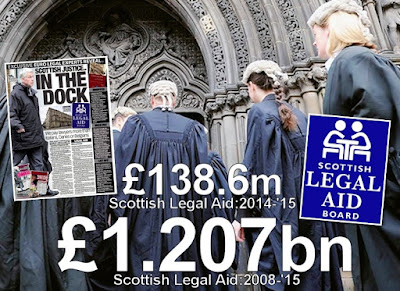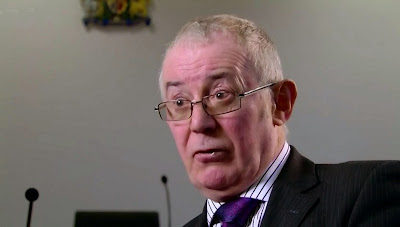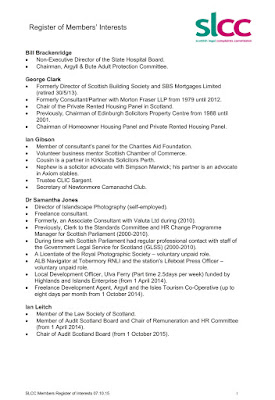 Top judicial post of Lord President taken by Lord Carloway. SCOTLAND’S Lord Justice Clerk - Lord Carloway - has been confirmed as the new Lord President & Lord Justice General of the Court of Session.
Top judicial post of Lord President taken by Lord Carloway. SCOTLAND’S Lord Justice Clerk - Lord Carloway - has been confirmed as the new Lord President & Lord Justice General of the Court of Session.
The post of Lord President – with a salary of £220,655 per year - became vacant after Lord Brian Gill unexpectedly walked out of the top judicial post in May of this year – giving only 30 days notice he intended to quit.
The move, elevating the Lord Justice Clerk to the top job of Lord President comes after a secretive panel constituted by First Minister Nicola Sturgeon under the Judiciary and Courts (Scotland) Act 2008.
The behind-closed-doors panel, comprising Sir Muir Russell & Mrs Deirdre Fulton from the Judicial Appointments Board for Scotland, Lord Reed of the UK Supreme Court and Court of Session judge Lady Dorrian - began a search in July for a new top judge - with orders to recommend a name to the First Minister by 30 October 2015.
The secretive recruitment process for a Lord President is reported in further detail here: To play the President - Hunt begins for Scotland’s next top judge
Lord Carloway – real name Colin Sutherland - is known for his backing for the Scottish Government’s failed plan to remove corroboration from Scots law.
While in the role of Lord Justice Clerk, Lord Carloway authored the Carloway Review Report & Recommendations 2011 – which backed a joint effort by Scottish Ministers and the Crown Office to remove the centuries old safeguard against wrongful convictions requiring evidence in criminal trials to be corroborated from two independent sources.
The Carloway Review and it’s recommendation to abolish corroboration - was opposed by members of the judiciary in their Response by the Senators of the College of Justice to SG consultation : Reforming Scots Criminal Law & Practice.
The campaign to retain corroboration was backed by Lord Gill - the then Lord President - who spoke out at the Scottish Parliament’s Justice Committee - defining the injustice safeguard as one of the "finest features" of Scotland’s justice system. Video footage of Lord Gill’s evidence to MSPs can be found here: Lord President Brian Gill evidence to Justice Committee on retention of corroboration
The same Justice Committee – who voted against plans to remove corroboration from Scots Law - dubbed Lord Carloway “disdainful and dismissive” over his support for scrapping the need for corroboration in criminal cases.
In April of this year, as the Scottish Government retreated on their plans to abolish corroboration - Lord Carloway hit out at elements of the legal profession who campaigned for retention of the injustice safeguard.
 During Lord Carloway’s speech to the Commonwealth Association of Law Reform Agencies Biennial Conference - the Lord Justice Clerk accused lawyers & critics of having "transparent self-interest" in retaining the centuries old injustice safeguard.
During Lord Carloway’s speech to the Commonwealth Association of Law Reform Agencies Biennial Conference - the Lord Justice Clerk accused lawyers & critics of having "transparent self-interest" in retaining the centuries old injustice safeguard.
Lord Carloway said: "Reactionary or excessively defensive forces among the legal profession can, and often do, behave in a manner obstructive to progressive law reform, especially where there is transparent perceived financial self-interest."
The judge’s remarks provoked robust responses from Thomas Ross - the Chair of the Criminal Bar Association, reported in The Herald HERE
Mr Ross argued lawyers opposed to ending the safeguard - under which two pieces of evidence are required to secure a conviction - were acting against their own financial interests.
Recently Lord Carloway was appointed head of the Scottish Sentencing Council – a quango created by Scottish Ministers which was condemned by two previous Lord Presidents – Lord Gill and Lord Hamilton – as a political attempt to interfere with the judiciary and Scotland’s courts system.
The appointment of Lord Carloway to the role of Lord President – made by the Queen upon receiving a nomination from the First Minister - retains the 500 year old tradition of male only top judges.
Lord Carloway will be formally installed as Lord President early in the new year, 2016.
Once appointed as Lord President, Lord Carloway will be asked to give evidence to the Scottish Parliament’s Public Petitions Committee in connection with three year probe on proposals to require judges to register their interests, as called for in Petition PE1458: Register of Interests for members of Scotland's judiciary.
If Lord Carloway’s stated views on ‘transparency and self interest of vested legal interests’ are anything to go by, perhaps the new Lord President will reach a different view from his predecessor Lord Gill – who spent two of his three year term as top judge fighting plans to enhance judicial transparency with a register of judges’ interests.
The petition calls for the creation of a publicly available register of judicial interests containing information on judges backgrounds, their personal wealth, undeclared earnings, business & family connections inside & outside of the legal profession, offshore investments, hospitality, details on recusals and other information routinely lodged in registers of interest across all walks of public life in the UK and around the world.
The proposal to require judges to declare their interests enjoys cross party support, and was widely backed by MSPs during a full debate in the Scottish Parliament’s main chamber on 9 October 2014 - reported in full with video footage of MSPs and Scottish Ministers speaking during the Holyrood debate, here: Debating the Judges.
Previous articles on the lack of transparency within Scotland’s judiciary, investigations on judicial interests including reports from the media, and video footage of debates at the Scottish Parliament’s Public Petitions Committee can be found here : A Register of Interests for Scotland's Judiciary
Lord Carloway’s appointment as Lord President has been welcomed by the Dean of the Faculty of Advocates, who were recently revealed to have taken ownership of Scotland’s top court buildings from Edinburgh City Council.
James Wolffe QC, Dean of the Faculty of Advocates, said: “His appointment as head of Scotland’s judiciary is richly merited – having regard not only to his personal qualities but to his distinguished career of service, as an advocate before his appointment to the bench in 2000, as a judge since that date, and since 2012 as Lord Justice Clerk.
“Lord Carloway becomes Lord President at an important time for our legal system as it responds to technological, social and institutional change. I look forward very much indeed to working with him.”
Christine McLintock, President of the Law Society of Scotland who spent much of the week condemning legal aid cuts, commented: “I warmly congratulate Lord Carloway on his appointment. As one of our most senior and respected judges, and with a wealth of experience across both criminal and civil law, he has already made a substantial contribution to justice and the rule of law here in Scotland. I have every confidence he will make an even greater contribution as our Lord President.
“Lord Carloway assumes this role at a critical time for Scotland’s justice system, with major reforms to improve the efficiency of our courts but also pressures from reductions in public spending. We are also seeing a transformation in the legal services market, with new business models, changing expectations from clients and a greater internationalism amongst legal firms. Against this backdrop of change, we look forward to working with Lord Carloway, building on the excellent relationship we have enjoyed with him as Lord Justice Clerk.”
The appointment now creates a vacancy for the office of Lord Justice Clerk.
The First Minister is required by s19 of the Judiciary and Courts (Scotland) Act 2008 to establish a panel to recommend individuals suitable for this appointment.
Lord Carloway’s most recent appearance at the Scottish Parliament came during an evidence session before the Justice Committee on 8 December 2015 during which the Lord Justice Clerk gave evidence to MSPs on the Abusive Behaviour & Sexual Harm (Scotland) Bill.
Lord Carloway Justice Committee Scottish Parliament 8th December 2015
LORD CARLOWAY:
Lord Carloway is a graduate of Edinburgh University (LLB Hons) and was admitted to the Faculty of Advocates in 1977. He served as an Advocate Depute from 1986 to 1989 and was appointed Queen’s Counsel in 1990. From 1994 until his appointment as a Judge he was Treasurer of the Faculty of Advocates.
Lord Carloway was appointed a Judge in February 2000 and was elevated to the Inner House in August 2008. He became Lord Justice Clerk in August 2012.
He was an editor of ‘Green’s Litigation Styles’ and contributed the chapters on ‘Court of Session Practice’ to the Stair Memorial Encyclopedia and ‘Expenses’ in Court of Session Practice.
Lord Carloway was the joint editor of ‘Parliament House Portraits: the Art Collection of the Faculty of Advocates’ and is a former president of the Scottish Arts Club. He is the author of the Carloway Review on key elements of criminal law and practice which was published on 17 November 2011. Many of the recommendations from this review have been taken forward in the Criminal Justice (Scotland) Bill, approved by Parliament earlier this week.
Lord Carloway is also currently leading a steering group overseeing the Scottish Court and Tribunal Service review into Evidence and Procedure, including options for improving how children and other vulnerable witnesses provide evidence in criminal cases.












